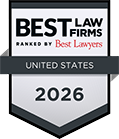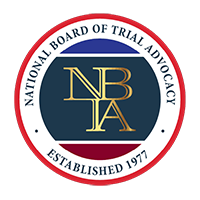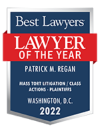Call Us Now
202-463-3030
Schedule a Free Consultation
Premises liability lawsuits arise when unsafe property conditions lead to injuries that could have been prevented, and Regan Zambri Long’s award-winning Washington, DC premises liability lawyers have spent decades holding negligent property owners accountable. Our board-certified partners are all named among the nation’s 500 Leading Plaintiff Consumer Lawyers, and we bring nearly 200 years of combined experience to cases involving unsafe buildings, inadequate maintenance, and failures to protect lawful visitors.
Recognized as one of America’s Best Law Firms, our reputation is backed by substantial resources, allowing us to work closely with leading medical, engineering, and safety experts to build strong, evidence-driven claims. We’ve achieved over $1 billion in recoveries since 1997, including major premises liability results of $77 million, $16 million, $15.2 million, and $10 million. Clients also trust us based on more than 100 5 star Google reviews that reflect consistent service and results.
Have you or a loved one been injured due to unsafe property conditions in Washington, DC? Contact Regan Zambri Long today, and one of our attorneys will personally get back to you. We’re available 24 hours a day, 7 days a week, and there is no fee unless we win your case.
Complete this form and our team will get back to you as soon as possible








When you’ve been injured due to hazardous conditions on someone else’s property, you may have grounds for a premises liability claim. Talk to a DC premises liability lawyer at Regan Zambri Long PLLC for a free case review.
Property owners have a legal duty to keep their premises reasonably safe for visitors. Whether it’s a slip on a wet floor, a trip over damaged pavement, or any preventable mishap, the law says they must promptly address potential dangers.
Filing a premises liability claim is about proving the owner knew (or should have known) about the unsafe condition but failed to address it properly. Maybe there was no warning sign for that spill. Or perhaps repairs weren’t made despite complaints about that broken stair. An experienced lawyer will investigate exactly what went wrong and gather the evidence to establish liability.
From there, it’s a matter of calculating the full costs of your injury – medical bills, lost wages, pain and suffering, and more. The property owner’s insurance company may try to lowball you. But armed with a strong premises liability case, your personal injury lawyer will fight to recover the complete compensation you deserve for someone else’s negligence upending your life.
MILLION
Wrongful Death Settlement
MILLION
MILLION
Wrongful Death Verdict
MILLION
Premises Liability Settlement
MILLION
Wrongful Death Settlement
MILLION
Wrongful Death Verdict
MILLION
Medical Malpractice Settlement
MILLION
Personal Injury Settlement
MILLION
Car Accident Settlement
When you get injured on someone else’s property, the owner is only responsible if you prove they were negligent. Just because an accident happened doesn’t automatically mean the property owner is liable. There are specific criteria that must be established.
Building a strong premises liability case requires meticulous investigation and a strategic approach. Having an experienced personal injury attorney gather that evidence of negligence gives you the best chance at the compensation you deserve.
When it comes to a premises liability accident, the legal responsibilities of a property owner can vary significantly depending on your reason for being on their property. The law recognizes three distinct categories that determine just how much care is owed to you as a visitor.
Premises liability covers many scenarios where a property owner’s negligence leads to preventable injuries. Here are some of the most common types of premises liability cases:
One of the most frequent premises liability incidents is slip-and-fall accidents, and the scale of harm caused by falls is well documented. According to the National Safety Council, falls account for 21% of all preventable injury-related deaths. In 2023 alone, 47,026 people died as a result of fall-related injuries. These can happen due to poorly maintained floors, obstacles left in walkways, a lack of warning signs for slippery surfaces, and more. What may seem minor can lead to severe injuries like broken bones or traumatic brain injuries when property owners are negligent.
We rely on elevators and escalators to safely transport us, but mechanical failures, poor maintenance, or hazardous conditions can turn these conveniences into serious dangers. Suddenly getting trapped, falling, or having equipment malfunctioning can result in devastating injuries.
Whether a landlord skimps on proper lighting and locks, a business fails to have security personnel for crowd control or any other lapse in adequate security measures; property owners must be held accountable when their negligence enables criminal activity and violence that harms innocent people.
From tools and inventory negligently stored at construction sites to poorly secured fixtures and equipment at businesses, falling objects pose serious crush and head injury risks. When proper precautions aren’t taken, the results can be catastrophic for employees and customers.
Active construction zones are inherently hazardous, which doesn’t excuse cutting corners on required safety protocols. Scaffolding accidents, trench collapses, electrical shocks – these and other construction incidents are frequently tied to contractors’ and site managers’ skirting regulations to protect workers.

Public and residential pools can quickly turn tragic when drain covers are broken, there is a lack of supervision or safety equipment, or slip risks aren’t addressed. A 2025 report from the Consumer Product Safety Commission highlights how severe these risks can be, estimating an annual average of 6,300 pool or spa related nonfatal drowning injuries treated in emergency departments from 2022 through 2024.
Kids are especially vulnerable, making pool safety a must for responsible property owners. The same report found that 73% of nonfatal drowning injuries and 79% of fatal drownings involved children younger than 5, showing how quickly unsafe conditions can become deadly for the youngest visitors.
When you entrust your child’s care to a daycare, school, or activity center, you expect they’ll be properly supervised and protected. Incomplete national data shows that at least 40 children died in daycare centers across the United States in 2023. Injuries are also common in school environments, with a 2023 study of injuries among U.S. school children finding that around 65% of pediatric trauma patients were injured at elementary, middle, and high schools. Any lapse in reasonable precautions that enables bullying, unsafe playground conditions, or other scenarios where kids get hurt is unacceptable negligence.
The premises liability umbrella also covers accidents at amusement parks, water parks, sporting events, dog attacks, and any other situation where a property owner’s failure to maintain a safe environment harms lawful visitors.
Property owners have real legal responsibilities regarding keeping their premises safe for visitors.
First and foremost, property owners owe a “duty of care” to anyone lawfully on their property—whether it’s a customer, tenant, contractor, or other guest. This duty legally obligates them to take reasonable care to address potential hazards that could foreseeably lead to injury.
What exactly are those legal obligations? They include properly maintaining the property, routinely inspecting for hazards, repairing issues promptly, providing adequate lighting and security, using appropriate warning signs for dangers, and exercising ordinary care that a reasonable person would under similar circumstances.
Failing to salt icy sidewalks in the winter, neglecting to fix broken stairway railings, inadequate security enabling assaults, and lack of supervision at pools are examples of property owner negligence that can have devastating consequences. When they shirk their basic duty of care responsibilities, they open themselves up to major premises liability lawsuits from those unfairly harmed.
The first hurdle in a premises liability case is establishing that the property owner was negligent and, therefore, liable for your injuries. This requires proving they knew or should have known about the hazardous condition yet failed to address it reasonably.
Evidence like photographs, video footage, maintenance records, witness accounts, and expert analysis all help build this critical argument.
Once liability is determined, calculating the full extent of damages you’ve incurred from the property owner’s negligence is a matter of fact. This covers economic losses like current and future medical expenses, lost wages from missed work, and non-economic harm like physical pain, emotional distress, and diminished quality of life. Having proper documentation of all these losses is key to pursuing appropriate compensation.
The property owner’s insurance company will certainly push back with settlement offers. But with a skilled premises liability lawyer handling negotiations and potential trial proceedings, you boost your chances of recovering a full and fair financial recovery. The goal is to make you as whole as possible after an incident that never should have occurred in the first place.
Washington, DC, operates under the contributory negligence rule, which is a strict standard compared to the more common comparative negligence rule. Under contributory negligence, if a plaintiff is found even minimally responsible for their injury, they may be barred from recovering any damages. This means that if the plaintiff’s own negligence contributed in any way to the harm they suffered, they cannot receive compensation from the defendant.
Consider this example: You’re in a supermarket and spot a spill on the floor. Despite noticing it, you walk through and slip, injuring yourself. Because you saw the hazard and didn’t avoid it, you could be deemed partially at fault. Under contributory negligence, this minor fault would prevent you from obtaining compensation from the store, even if their failure to clean up was the primary cause.
This strict rule emphasizes the need for personal responsibility and caution because even a small amount of fault on the plaintiff’s part can prevent them from getting any compensation for their injuries. This makes it very important to prove that the defendant was entirely responsible for causing the injury, which can be difficult in personal injury cases in Washington, DC.
If you or a loved one has been injured due to a property owner’s negligence in Washington, D.C., don’t try to navigate the complex legal process alone. An experienced premises liability lawyer can mean the difference between getting fairly compensated or derailing your case from aggressive insurance tactics. That’s why the respected firm Regan Zambri Long offers completely free, no-obligation case evaluations.

For almost 30 years, Regan Zambri Long has been a preeminent name in DC personal injury law. Our accomplished attorneys have secured over $1 billion for clients through meticulous casework.
That record includes substantial recoveries in premises liability cases involving unsafe buildings, defective playground equipment, inadequate maintenance, and failures to protect tenants, customers, and children from known dangers.
We understand premises liability law inside and out — from investigating negligence to negotiating maximum settlements. We’ll stand up against insurance companies and property owners who try to minimize your damages. If a trial is needed to get justice, you can trust the law firm of Regan Zambri Long’s strong courtroom skills, developed over decades of successful verdicts.
That depth of experience is also reflected in Regan Zambri Long’s long-standing leadership roles and recognition within Washington, DC’s legal community, where our attorneys have helped shape personal injury practice and trial advocacy:
Don’t take chances with your premises liability claim. Contact our distinguished lawyers at Regan Zambri Long for a free consultation. With our advocacy and litigation skills on your side, you maximize your ability to recover the full compensation you deserve.
Have you or your loved one sustained injuries in Washington DC, Maryland or Virginia? Regan Zambri Long PLLC has the best lawyers in the country to analyze your case and answer the questions you may have.